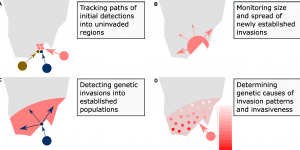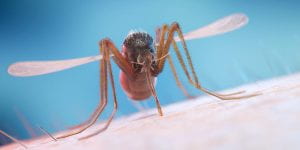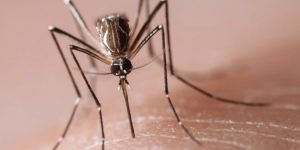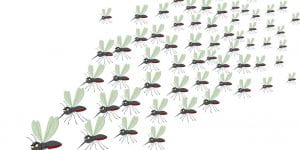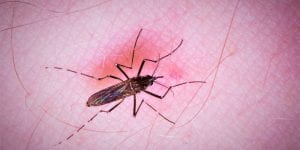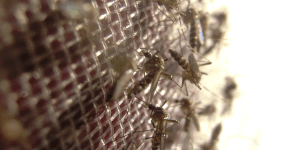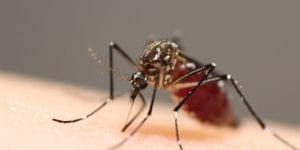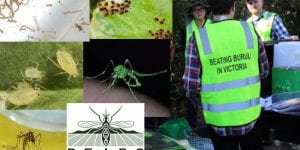Tag: dengue
-
Dengue-blocking mosquitoes here to stay
This article was first published on Pursuit. Read the original article. Dr Perran Stott-Ross Story Producer: Nerissa Hannink Dengue fever and other mosquito-borne diseases remain a massive threat to human health and wellbeing. Urbanisation and climate change are likely to increase this threat as established mosquitoes spread to new environments and gain a foothold. Eradicating […]blogs.unimelb.edu.au/pearg/2022/04/12/dengue-blocking-mosquitoes-here-to-stay
-
Improving mosquito control strategies with population genomics
Words: Tom Schmidt When researchers want to investigate evolutionary processes like adaptation and dispersal, they frequently make use of population genomic methods. Population genomics uses DNA data from across an organism’s entire genome – that is, across all of that organism’s DNA. This DNA data can be compared with DNA from other organisms, which can […]blogs.unimelb.edu.au/pearg/2021/06/28/improving-mosquito-control-strategies-with-population-genomics
-
Tracking the movement of mosquito stowaways
This article was first published on Pursuit. Read the original article Dr Tom Schmidt Everyone knows mosquitoes can fly. Not everyone knows they fly in pressurised cabins 10,000 metres above the ocean. In fact, many of the most dangerous mosquito species get flown all over the world in aeroplanes, or travel on boats or other […]blogs.unimelb.edu.au/pearg/2020/08/05/tracking-the-movement-of-mosquito-stowaways
-
Dengue-blocking bacteria endure the heat
“This article was first published on Pursuit. Read the original article.” Dr Perran Stott-Ross and Professor Ary Hoffmann Bushfires. Coral bleaching. Heatwaves. These disastrous events are a harsh reality in Australia. And they’re only going to become more frequent and severe with climate change. Last year, 2019, was Australia’s hottest year ever recorded, and records […]blogs.unimelb.edu.au/pearg/2020/01/24/dengue-blocking-bacteria-endure-the-heat
-
Variability in mosquito host-seeking ability
Words and images: Meng-Jia Lau Behaviour is one of the most complex study areas in biology because it involves a combination of many factors that are often quite variable. In mosquitoes, host-seeking is the behaviour of females seeking a blood meal which provides the extra protein they need in order to lay eggs. The biting […]blogs.unimelb.edu.au/pearg/2019/11/28/variability-in-mosquito-host-seeking-ability
-
Establishment of Wolbachia Strain wAlbB in Malaysian Populations of Aedes aegypti for Dengue Control
Our freshly published open access paper in Current Biology is the culmination of several years of work with a large team of very talented and dedicated researchers. Rather than rehash the story here, please see press releases below: Press release from the UniMelb newsroom (alternatively at Bio21’s siteBio21’s site or at SciMex) Brief summary article […] -
Lab-reared mosquitoes maintain their lust for blood
Words and images: Perran Ross Modified mosquitoes raised in laboratories are being released into the wild in disease control programs. These mosquitoes will still bite you, but they’re less capable of transmitting the viruses that cause dengue fever, Zika and more. This antiviral effect is caused by infection with a bacterium called Wolbachia, which occurs […]blogs.unimelb.edu.au/pearg/2019/11/07/lab-reared-mosquitoes-maintain-their-lust-for-blood
-
Releases of Wolbachia-infected mosquitoes for disease control
Words and images: Perran Ross When animals raised in captivity are released back into the wild, you might picture cute and furry mammals from an endangered species. But in many countries around the world, people are releasing mosquitoes raised in laboratories into the environment. These mosquitoes feed on human blood and are vectors of dengue, […]blogs.unimelb.edu.au/pearg/2019/09/18/releases-of-wolbachia-infected-mosquitoes-for-disease-control
-
Using bacteria to control mosquitoes Dr Tom Schmidt and Professor Ary Hoffmann “This article was first published on Pursuit. Read the original article.” Living inside the cells of insects is a type of bacteria that is looking increasingly like the key to controlling the spread of dengue fever, the Zika virus and other mosquito-borne diseases. […]
-
MSc projects 2020 – Students wanted
We are seeking motivated MSc students to apply for several projects starting next year. Enquiries via pearg-queries@unimelb.edu.au Project 1/4: Exploring bacterial symbionts for agricultural pest control PEARG is researching ways to control important agricultural pests such as aphids and mites that cause millions of dollars in damage to crops each year in Australia. This project […]blogs.unimelb.edu.au/pearg/2019/06/14/msc-projects-2020-students-wanted
Number of posts found: 18

